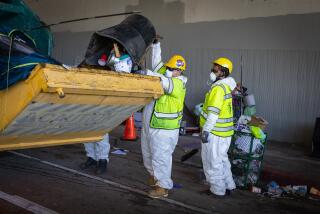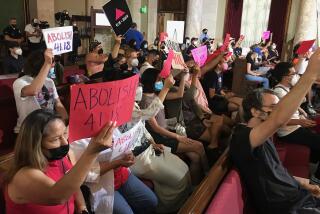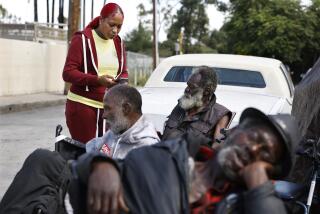L.A. delays the next phase of removing homeless people from Venice boardwalk
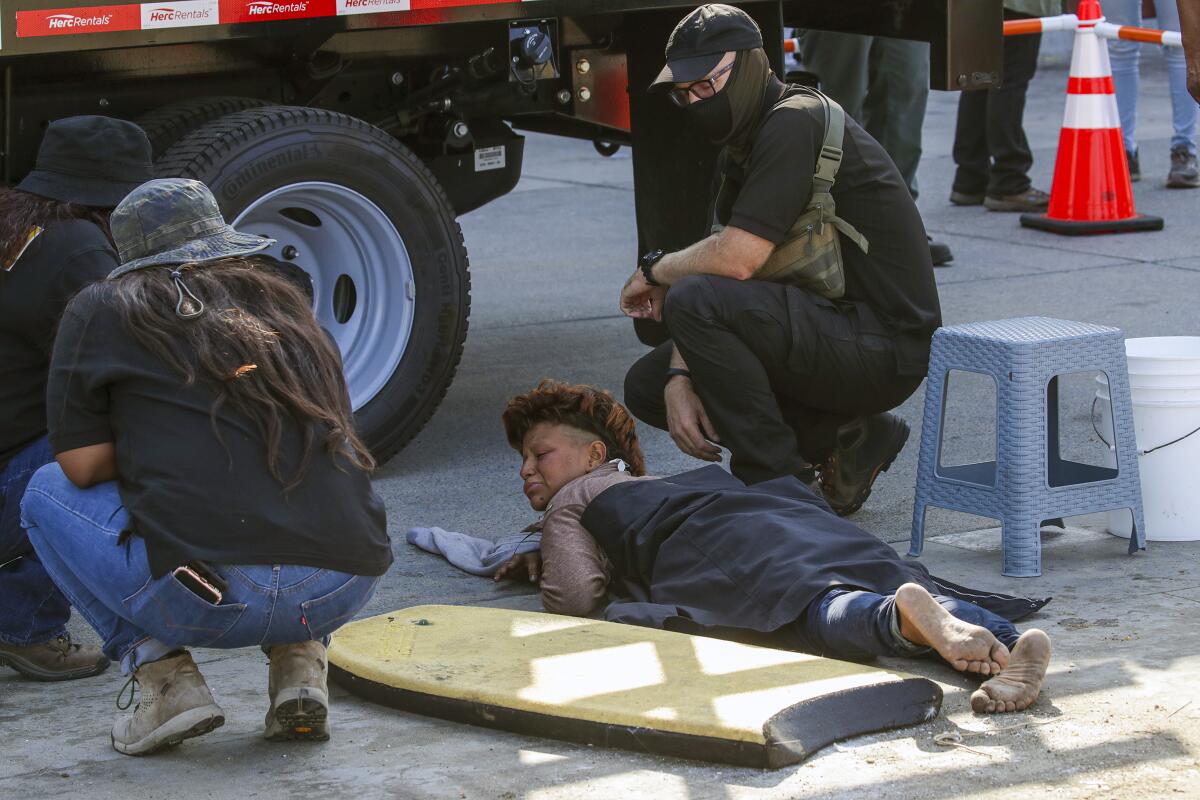
Los Angeles city officials backed away Friday from a deadline to clear all tents and other dwellings from the north end of Venice boardwalk, giving those living there illegally another week to comply.
After posting notices of a major cleaning north of Rose Avenue, city crews instead cordoned off an area south of Rose and spent the morning sorting through one man’s extensive camp, crating some of his possessions for storage and hauling away everything else.
By Friday, several people who were camped on the north end of the boardwalk had left, but those remaining had substantial spreads, one a structure of two-by-fours and siding and another a store window-type display of art and collectibles.
The delay puts a hitch in Councilman Mike Bonin’s plan to clear the entire boardwalk by July 30. The milelong area where tents have proliferated on city parkland, in violation of the park curfew, had been divided into five zones with one zone to be cleared each week.
In the face of mounting public outrage over trash, violence and fires in Venice’s expanding homeless camps, Bonin proposed the phased plan, with a promise of shelter or housing for everyone displaced, as a more humane approach to reclaiming public space than the last-minute sweep to clear Echo Park Lake in March.
The first zone, at the south end from Windward to Park avenues, was mostly completed on schedule July 2, but one cluster of tents at Park Avenue remained until sanitation workers accompanied by Los Angeles Police Department officers returned after the 2 a.m. park curfew Wednesday. Two more stragglers were ordered to leave Thursday morning.
The second phase was to be completed Friday. Va Lecia Adams Kellum, president and chief executive of Venice-based St. Joseph Center, which is leading the outreach, said the delay resulted from the lessons of the first phase.
“We need more time to work with them,” said Adams Kellum, who attended the cleanup Friday. “We’re learning as we go. It just seems to me that we can be more humane if we can slow down a little bit and let people go through their stuff so that they have a successful transition into housing, so that they’re not there worried that they’re going to lose everything.”
Absent from the scene were L.A. County sheriff’s deputies, who had briefly conducted their own outreach last month after Sheriff Alex Villanueva said he wanted the boardwalk cleared by July 4. Villanueva later said he meant the statement as an aspiration, not a deadline, and the outreach stopped. On Thursday, a sheriff’s patrol car appeared in the Rose Avenue parking lot, and deputies detained two men on bicycles. They held then held them until two more sheriff’s vehicles arrived, then released them.
But those were not the deputies specializing in homeless outreach, who have not returned.
For more than an hour Friday, sanitation workers sidestepped a young woman who lay face down beside a large sanitation truck appearing to be asleep.
At one point, one of the many observers who attend cleanups as witnesses asked Adams Kellum to intervene.
“What’s going on with that?” asked Peggy Lee Kennedy of the group Venice Justice Committee. “Maybe they could at least turn that truck off.”
“Yes, turn the truck off,” Adams Kellum said.
“They won’t listen to me,” Kennedy said.
Adams Kellum walked away to speak with the sanitation workers and the truck was turned off.
Shortly afterward, outreach workers from St. Joseph and the Los Angeles Homeless Services Authority persuaded the woman to go with them.
Adams Kellum said she would be evaluated for whatever help she may need beyond housing.
The camp targeted by the cleanup belonged to a man who was technically no longer living there.
Jack Rivers, who described himself as a Los Angeles native and veteran who had been living on the boardwalk for about 10 months, said he had a real bed nearby. He recently received a room in the nearby Cadillac Hotel, one of those leased to Project Roomkey, a federally funded program to house medically vulnerable homeless people during the coronavirus pandemic.
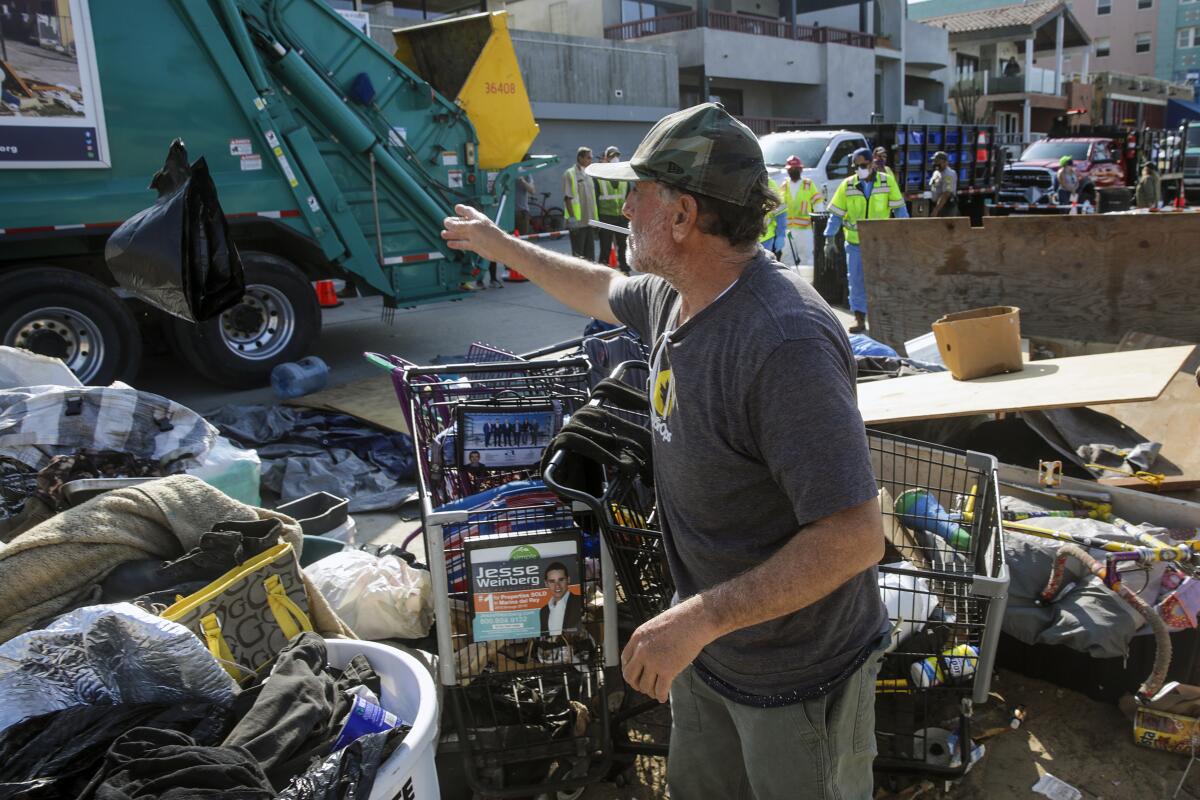
Rivers said medical issues, including a brain tumor, contributed to his present circumstances, but he also said he takes full responsibility for being an “obstinately” difficult rebel.
He said he had failed at three other placements with Project Roomkey, the Salvation Army and St. Joseph, attributing the bad outcomes to a lack of communication.
Many of the things he hoped to save had been purchased with his coronavirus stimulus check. When he feels stress, shopping helps, he said.
“I told them to save everything that is not obvious trash,” he said. “Unfortunately, it is very disorganized.”
As Rivers watched nervously, the workers began to move his possessions into 4-foot-tall plastic crates.
